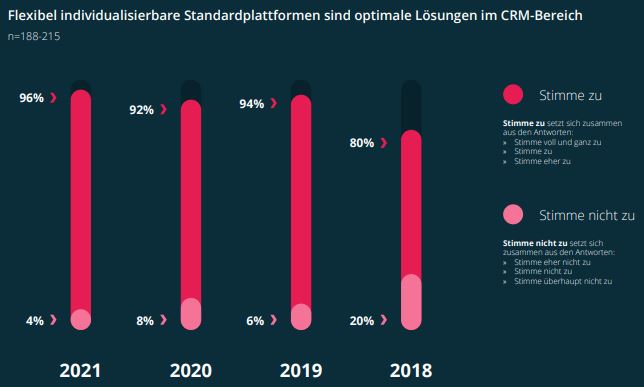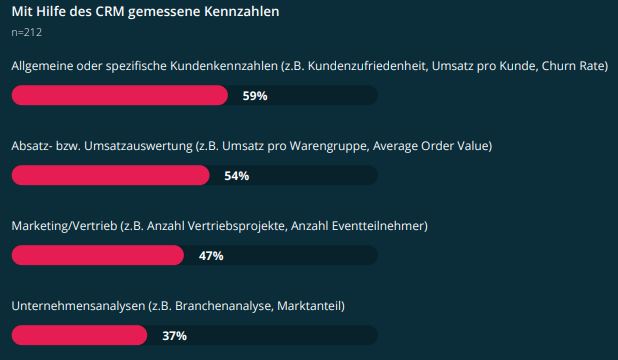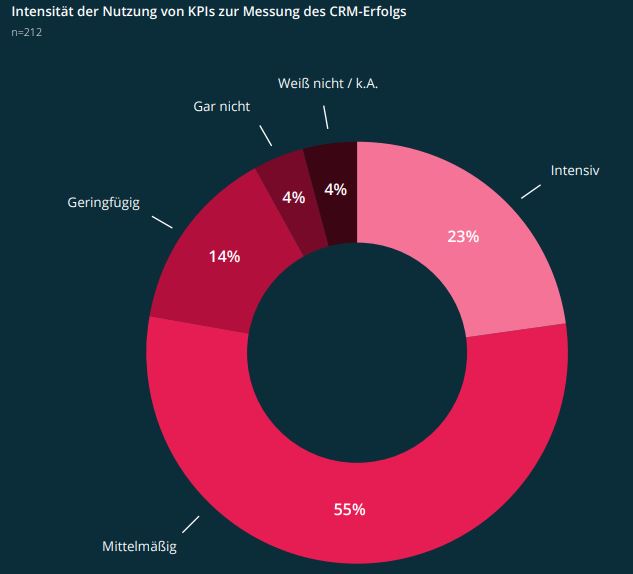The CRM Report of the management consultancy BÖCKER ZIEMEN in cooperation with ADITO, which will be carried out again after 2020, will once again take a close look at the implemented digitization of the companies surveyed this year.
215 companies were surveyed. 29% of the companies surveyed employ between 200 and 499 people. 34% employ between 500 and 1,000 employees and 36% of the companies surveyed have over 1,000 employees.
17% of the companies surveyed achieved a turnover of between € 25 – 100 million, 34 % between € 101 – 999 million, 18 % achieved a turnover of between € 1 – 2 billion and 18 % of the respondents even exceeded an annual turnover of € 2 billion.
The 3 most strongly represented sectors were service providers (30%), wholesale and retail (23%) and mechanical engineering (13%).
At this point, we would like to introduce you to our new newsletter News@CRM-TECH.WORLD in the subscription model!
As a subscriber, you will receive the latest information on all providers on our CRM landscape every 14 days. In addition, exciting articles such as this one are added. In these, we deal with technical, the latest trends, assess current developments and comment on the CRM landscape as a whole.
Interested? Then take the chance to read all provider news and articles in the free trial access:
For all information and to register click here!
Now, have fun reading this article and exploring News@CRM-TECH.WORLD!
What does the future of CRM software look like due to advancing digitization?
Since the beginning of the pandemic, a noticeable jolt has gone through many companies. The digitization strategy is suddenly at the top of the priority list and is seen by many as a success factor for the future. That is why it is important to become a “digitalization pioneer” for the future
Digitalization has also been driving changes in sales and marketing across the economy since the beginning of the corona pandemic.
Classic sales instruments such as customer visits, stands at trade fairs or customer events are currently difficult to implement. New ways must be found to retain existing customers and acquire new customers, and the digital transformation of a company can be an opportunity.
The prerequisite for this is a precise understanding of the potential customers and their needs. In this way, companies can react more individually and flexibly to customer requirements. The success factor for generating this information is customer relationship management.
Modern CRM systems that are seamlessly integrated into the system landscape not only enable the efficient management of contact data, but also the precise control of marketing and sales measures as well as the design of a customer journey based on customer insights. In practice, this is better customer service, for example, which leads to significantly higher customer loyalty and longer customer lifetimes. CRM systems thus form the heart of a more digital customer-centric corporate orientation and are crucial for the future competitiveness of companies.
Insights from the CRM Report 2021 – Distributing CRM and digitization across the company
Role of CRM systems
The bottom line: CRM systems will be highly important for a variety of marketing and sales decisions, especially compared to other systems (ERP, Marketing Automation, Document Management System).
Since last year, it has become clear that CRM systems increasingly play the central role in marketing and sales decisions compared to systems such as ERP, marketing automation and e-mail marketing as well as document management systems.
For example, 58% of all companies surveyed use their CRM or the data it contains to further develop existing products and to supplement them with digital components. When using digital channels in customer contact and improving marketing and sales processes, CRM also serves primarily as a basis for decision-making.
An individual standard
The bottom line: Flexibly customizable standard platforms are becoming the benchmark for CRM systems in companies. True to the motto: Low Code and No Code. Every user should be able to adapt his system to himself and not adapt to it.

When it comes to software implementations, companies are often faced with the question of whether a standard or individual programming is the better choice. Both variants provide their advantages and disadvantages.
With standard solutions, the advantages lie above all in a faster and more cost-effective software implementation. Benefiting from best practices is also perceived as an advantage.
According to the CRM Report 2020, the most relevant argument for individual solutions is the exact mapping of your own processes. In addition, individual solutions create the competitive advantage of differentiating from others.
Flexibly customizable standard platforms combine the advantages of standard and individual solutions. These can be achieved especially by software that allows low code or no code adjustments. In this way, the customer can lend a hand in the end.
Networking of systems and the end of data silos
Bottom line: Due to unstructured customer data and data islands, companies can’t get the most out of their data. Interlinked and cross-company IT systems will therefore play an even greater role in cross-company digitization in the future and dissolve data silos.
Often, so-called data islands in the form of non-networked systems can still be found in companies. This form of data storage prevents companies from getting the most out of their data.
In order to enable precise control of the company and the company’s activities, it is essential to break up these island structures. The keyword for this is interface programming.
This creates the basis for the exchange of data between the systems and prevents redundant and thus partly erroneous data. Currently, CRM systems are most frequently networked with ERP systems (53%) among the companies surveyed, followed closely by document management systems (51%) and content management systems (49%).
Digitization of processes
The bottom line: Many companies are giving away customer potential by not systematically using customer data and not sufficiently optimizing business processes. This endangers competitiveness and must be avoided by process-oriented CRM software.
CRM solutions are able to support a variety of business processes. Currently, classic sales processes, such as contact management or sales controlling, are controlled by CRM systems. Numerous CRM systems can also map processes such as service planning, ticket management or collaboration (especially between marketing and sales). However, these potentials are not yet exploited to an appropriate extent.
There is also untapped potential in the area of customer insights. By analyzing human behavior, companies can try to understand what their leads or customers want and need. However, the question of the extent to which customer insights are already derived from the CRM system has shown that there is still a lot of open potential. Half of the companies waste potential by not regularly deriving customer insights and not trying to align their own customer relationship management with the understanding of the individual customer.
KPIs
The bottom line: The use of KPIs today takes place especially at the operational level. The strategic level and thus the overall view of developments in the company is often neglected and is not very “digital” – this must change for the future.

When companies are asked about the goals or KPIs in their CRM strategy, the planning, management and control of marketing and sales activities are particularly superficial. In the future, however, the focus on holistic corporate management through the KPIs will be important. Currently, however, general or specific customer key figures as well as key figures for the evaluation of sales and revenue are primarily measured in CRM. This puts companies on a more operational level. The digital transformation in the economy is the opportunity to integrate these new key figures into daily work.











 CAS Software AG ist Marktführer für Kundenbeziehungsmanagement (CRM) im deutschen Mittelstand. Ob Marketing, Vertrieb oder Service – Anwender profitieren von effizienten Prozessen auf einer einheitlichen Datenbasis.
CAS Software AG ist Marktführer für Kundenbeziehungsmanagement (CRM) im deutschen Mittelstand. Ob Marketing, Vertrieb oder Service – Anwender profitieren von effizienten Prozessen auf einer einheitlichen Datenbasis.





